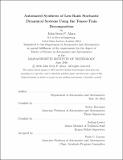Automated synthesis of low-rank stochastic dynamical systems using the tensor-train decomposition
Author(s)
Alora, John Irvin P
DownloadFull printable version (2.239Mb)
Other Contributors
Massachusetts Institute of Technology. Department of Aeronautics and Astronautics.
Advisor
Sertac Karaman.
Terms of use
Metadata
Show full item recordAbstract
Cyber-physical systems are increasingly becoming integrated in various fields such as medicine, finance, robotics, and energy. In these systems and their applications, safety and correctness of operation is of primary concern, sparking a large amount of interest in the development of ways to verify system behavior. The tight coupling of physical constraints and computation that typically characterize cyber-physical systems make them extremely complex, resulting in unexpected failure modes. Furthermore, disturbances in the environment and uncertainties in the physical model require these systems to be robust. These are difficult constraints, requiring cyberphysical systems to be able to reason about their behavior and respond to events in real-time. Thus, the goal of automated synthesis is to construct a controller that provably implements a range of behaviors given by a specification of how the system should operate. Unfortunately, many approaches to automated synthesis are ad hoc and are limited to simple systems that admit specific structure (e.g. linear, affine systems). Not only that, but they are also designed without taking into account uncertainty. In order to tackle more general problems, several computational frameworks that allow for more general dynamics and uncertainty to be investigated. Furthermore, all of the existing computational algorithms suffer from the curse of dimensionality, the run time scales exponentially with increasing dimensionality of the state space. As a result, existing algorithms apply to systems with only a few degrees of freedom. In this thesis, we consider a stochastic optimal control problem with a special class of linear temporal logic specifications and propose a novel algorithm based on the tensor-train decomposition. We prove that the run time of the proposed algorithm scales linearly with the dimensionality of the state space and polynomially with the rank of the optimal cost-to-go function.
Description
Thesis: S.M., Massachusetts Institute of Technology, Department of Aeronautics and Astronautics, 2016. This electronic version was submitted by the student author. The certified thesis is available in the Institute Archives and Special Collections. Cataloged from student-submitted PDF version of thesis. Includes bibliographical references (pages 79-83).
Date issued
2016Department
Massachusetts Institute of Technology. Department of Aeronautics and AstronauticsPublisher
Massachusetts Institute of Technology
Keywords
Aeronautics and Astronautics.